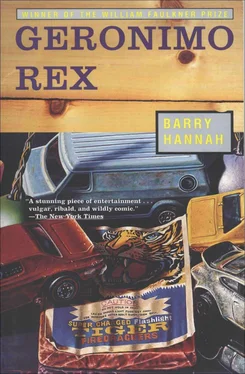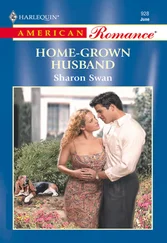“You mean do I think about my music when I’m working? Do you have to ask that ? I’m a musician, aren’t I? You bet I do, every minute of the day,” Butte said. I turned and saw him looking at me like I was crazy. “You’re a musician, ain’t ya? You play the trumpet. Don’t you think about your music all the time?”
I certainly didn’t, and suddenly, in Harley’s presence, I felt very lazy and feckless. No, I didn’t think about my music very constantly. There were even times when I’d walk in my room, see my horn on the bed, and be surprised that it was there, that it was mine, and that I was supposed to be able to play it.
“But I guess you’re thinking about girls now, aren’t you?” Harley answered for me. He hissed and seemed rather disappointed in me.
“Look. I feel sorta like a fool driving us around in your car. Where are we going?”
“I thought we would talk. I have to tell you something that I want to tell your daddy but can’t make myself do it. I don’t want you to tell him either.”
“Well hell, what is it?”
“I’m quitting him in August. I’m getting through with school and I have another job I have signed papers for.”
“Why can’t you tell the old man that?”
“He’s giving me a lot of money nowdays for being a foreman. He’s paid me for hours I wasn’t there and was out at Grell taking classes. And … and I don’t think he knows I was studying to be a band director. He’ll be mad and hell think I’m outa my mind to do it. I’m taking a big cutback in salary to take up this band. He’ll ask me about the money I’m making.”
“Where are you going?”
“Mississippi.”
“I’d think,” I began, sniffing the air now that we were right up next to the mills and going over the tracks and down to niggertown, and becoming awfully wise off that old smell, “you can’t get out of Dream of Pines without being cleaner than when you were in it.”
We drove aimlessly around the gravel and the pavement for a while and then I took myself home. Harley vented himself freely. He wanted to tell me what brought him to the mattress factory and how lucky he had been to land into it just after he’d gotten married. He’d had a busy four years, from the factory to Grell A. & M. to home, and wake up again. But at least, he said, it hadn’t ever really been hard knocks. He mentioned the fact that he had quite a bit of cash in his pocket at this very moment. He may have been the biggest mark in Dream of Pines at this moment, in fact. Harley considers it a miracle. He pats the dash and confides, “I don’t owe as much on this car as you’d expect, either.” I begin driving the car rather daintily. His face is crossed by the angelhair glow of some street-light, and brush shadows from a pine tree make their way across it. He is the color of the inside of a carrot. His head is high and alert, and his mouth seems to give him pleasure, moving, telling, laying it all out. He tells me about the army. He is going to make it back to that place of honor when he was briefly director of the company band at Fort Sill, Oklahoma. There aren’t going to be any woodpeckers who want to play jazz standing in his way. He would know how to handle that situation if it rose again. He knew so many more horns now; he could compose and arrange an original march given two free nights.
“I’ve been over a lot of people now. Not only at Grell in the band but at the factory too. I have been given charge. In three days, no, in one day, I can tell you the people who come to do business and the ones who come in for a escape from somewhere else.”
Harley was inclined to grow sort of tipsy off something he’d just said, if he thought it was particularly wise or correct or charming, and burst out with something else to go himself one better. This was what kept him talking constantly, open-endedly, once he got your ear. Not to say he was never wise or all the rest. But like then, he followed up on the idea of what a personality judge he was, and remarked, “If I meet a new married couple, at the end of five minutes I can tell you if they’re gointa stick with each other or not. I can tell you in one minute whether a certain person is instructable or not.”
“Oh yeah? I guess that makes life fairly easy for you, doesn’t it.”
“Look here, Harry. I’ve put in my hours . I have done my homework in this university of life. I have did my time in Ups and Downs College.”
Was it some scene I had seen in the movies, or was it something I had read? The man carrying a wad of money on him, new car, being very expert and gabby, while just around the corner … I didn’t want to think of that with Harley here. I liked him, and it was terribly pleasant to be sitting here in his car on our driveway and listening to Harley on Harley, even though he made me ashamed. I think now it was the bastard’s function to make me ashamed: I had had it so lazy and soft and didn’t even care much for what I had, while all the time Butte was attacking away under the name of some idea or other. Only it was this bad idea that was coming into the car with my not wanting it, resenting it when it came, but trapped by it. I looked at Harley’s confident face — the thickish lips opening and shutting like small weiners making coos — and I thought of bad luck and broken dreams. His queer ocher skin, was it, or was it the bandage on his wrist, his Tulane sports outfit, and all of it, the fat wallet, the new car, the drunk hope in his voice. My brother in the insurance field once told me that his company avoided selling life insurance to Negroes. The percentages for the company just didn’t pay off. Of all things, I thought about that fact just then. His company was an astute and studious firm that did huge volume all over the States. I thought of that. Either the Negroes did not pay the premiums or they died too soon, and maybe too often by violent accidents, which meant double indemnity. The facts rolled chock, chock in my head. What a nasty, morbid way to think; nothing had ever come to me like this before.
Then this horrible, filthy scheme of romance came into my mind. I began noticing Harley’s skull, seeing it as an item, a tender ball, a noun , to lay a tire-tool against, to whap. His skull invited me, me , to knock him out. And it wanted this bad luck, begged for it. And the wallet, and the new Plymouth. Take them. Easy business. Fly. Out of Dream of Pines, toward Malibu or green, rocky Canada. Hell, the insurance companies knew what Butte’s chances were anyway. Course of nigger Nature. Then get that one moment of fame you always wanted to come by casually some day. Be seen in the great spotlight of the cops, be fired upon, but yet escape, and have maybe fifteen minutes of local TV devoted to you. “… described as brooding but mild by his shocked father. Was a promising musician. But was at times rowdy, says his admitted girlfriend Miss Tonnie Ray Reese. She was ‘not wholeheartedly surprised,’ said Miss Reese.” Wouldn’t I stop thinking on this scheme? Finally, it was shut out for me by the flat thought that I was too much of a bore to even borrow his car without permission. And only then did I return to the only fact there should have been: I was too humane to hurt Butte; I cared for him; I’d protect him from as much as an insult.
What this runaway thought-scheme had to do with Harley or me, I had no idea. Bad, bad news had appeared in the car with us; I had an itchy, criminal feeling.
He thought I was observing him because of being avid to hear more of his life story. He speaks as he unwraps the gauze on his arm to discover just what his cut is like. I become overly polite again, wanting to make up for the horrors that were in my mind, wanting to ease him, aid him. He is going on about my old man again, raising Ode Elann into some unknown idol that he’s ashamed to cross or show the triflingest intimation of ingratitude toward. So I jump in to help him out.
Читать дальше












